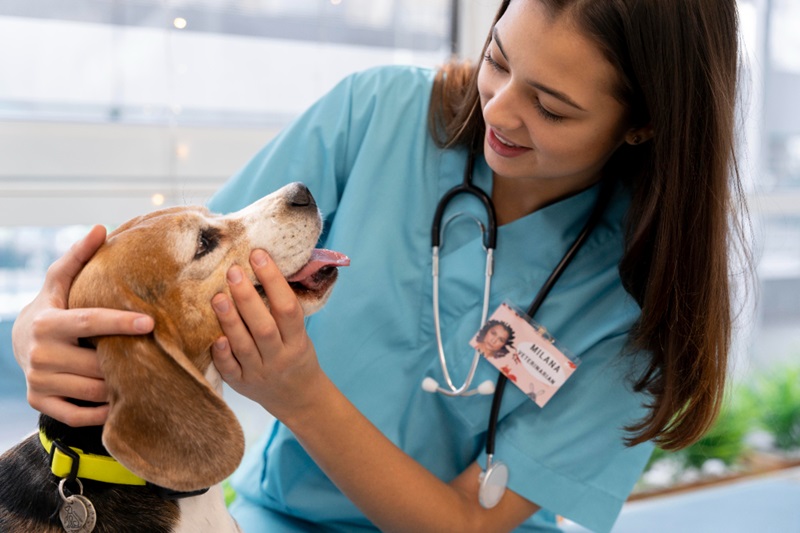Caring for a pet involves being vigilant about their health and recognizing signs of illness early. While pets cannot voice their discomfort, attentive owners can detect issues through changes in behavior, appearance, or appetite. This article highlights common pet health problems and offers guidance on prevention and treatment.
1. Obesity
Obesity is one of the most prevalent health issues in pets, particularly dogs and cats. Excess weight can lead to serious conditions such as diabetes, arthritis, and heart disease.
Causes:
- Overfeeding or excessive treats.
- Lack of exercise.
- Feeding inappropriate diets.
Prevention and Treatment:
- Feed pets according to their caloric needs.
- Opt for healthy, low-calorie treats.
- Engage them in regular physical activities.
2. Dental Disease
Dental problems, including gum disease and tooth decay, are common in pets and can lead to pain, infection, and difficulty eating.
Symptoms:
- Bad breath.
- Red or bleeding gums.
- Difficulty chewing.
Prevention:
- Brush your pet’s teeth regularly.
- Provide dental chews and toys.
- Schedule professional cleanings as needed.
3. Parasites
Parasites such as fleas, ticks, and worms can cause discomfort and serious health problems.
Symptoms:
- Scratching or biting at the skin.
- Hair loss or rashes.
- Visible worms in feces.
Prevention:
- Use vet-recommended preventive treatments.
- Maintain a clean living environment.
- Conduct regular grooming and inspections.
4. Allergies
Pets can suffer from environmental, food, or flea allergies, leading to itchy skin, digestive upset, or respiratory issues.
Symptoms:
- Excessive scratching or licking.
- Red, inflamed skin.
- Vomiting or diarrhea.
Management:
- Identify and eliminate allergens.
- Use hypoallergenic diets if necessary.
- Administer medications prescribed by a vet.
5. Ear Infections
Ear infections are common in pets with floppy ears or those prone to allergies.
Symptoms:
- Head shaking or tilting.
- Red, swollen ears.
- Unpleasant odor from the ears.
Prevention:
- Keep ears clean and dry.
- Avoid moisture buildup after baths or swimming.
6. Arthritis
Arthritis affects many older pets, causing joint pain and reduced mobility.
Symptoms:
- Difficulty standing or climbing stairs.
- Limping or stiffness.
- Reluctance to play.
Management:
- Provide joint supplements or pain medications.
- Use orthopedic beds for support.
- Maintain a healthy weight to reduce joint strain.
7. Gastrointestinal Problems
Vomiting and diarrhea are common symptoms of gastrointestinal distress in pets.
Causes:
- Dietary indiscretion.
- Infections or parasites.
- Food intolerances.
Prevention and Treatment:
- Feed a consistent, high-quality diet.
- Avoid feeding table scraps or unfamiliar foods.
- Consult a vet for persistent symptoms.
8. Skin Conditions
Skin problems like hot spots, dandruff, or infections are common in pets.
Causes:
- Allergies.
- Parasites.
- Poor grooming habits.
Management:
- Regular grooming and bathing.
- Use vet-approved shampoos for sensitive skin.
- Address underlying allergies or infections.
Recognizing Emergencies
Certain symptoms require immediate veterinary attention, including:
- Difficulty breathing.
- Persistent vomiting or diarrhea.
- Seizures or loss of consciousness.
- Inability to urinate or defecate.
Building a Preventive Care Routine
Preventive care is the best approach to keeping your pet healthy:
- Schedule routine vet visits.
- Keep vaccinations and parasite preventatives up to date.
- Monitor your pet’s weight, activity, and behavior.
Conclusion
Being proactive about your pet’s health ensures they live a happy, comfortable life. By understanding common health problems and how to address them, you can provide your furry friend with the care they deserve. Regular check-ups, a balanced diet, and attentive care can prevent many issues and ensure a lifetime of companionship.


